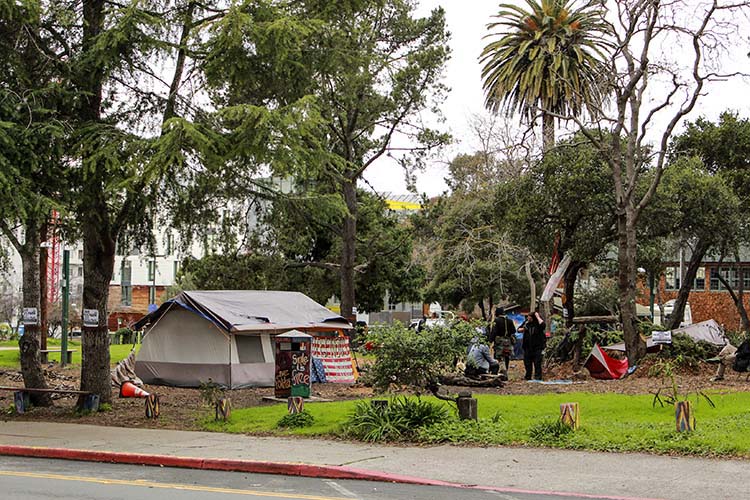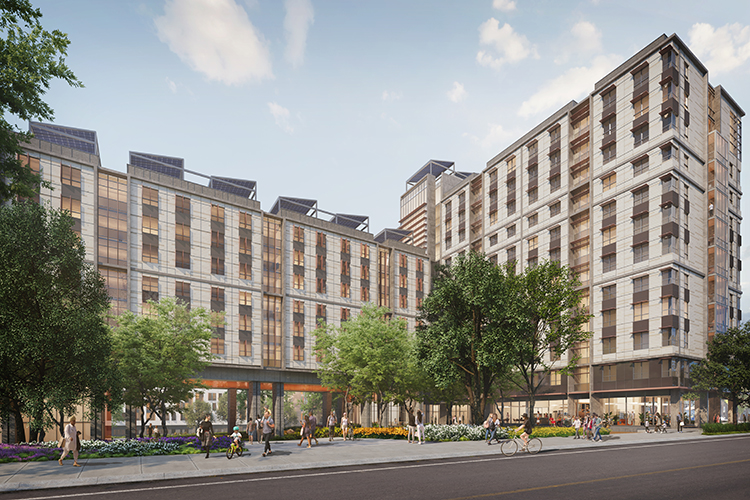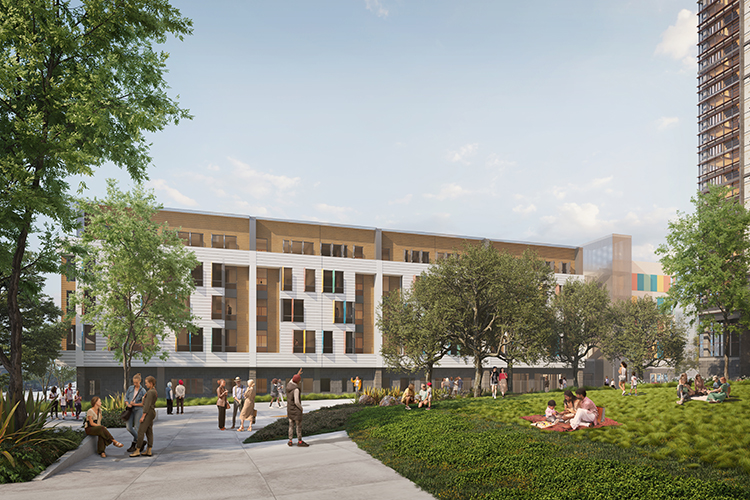Campus, city form model alliances to aid unhoused people in People’s Park
With two new housing projects and a landscaped glade planned for the site, unique partnerships have launched to provide shelter and services for those who currently live and gather at the park.

March 9, 2022
Novel partnerships unveiled today — one between UC Berkeley, the city of Berkeley and several local nonprofit organizations, and the other between the campus, the city and a local church — will support unhoused individuals who live and gather in People’s Park, where work will begin this summer on urgently-needed student housing and on an open space revitalization project.
At a 1 p.m. virtual news conference, Berkeley Chancellor Carol Christ, Berkeley Mayor Jesse Arreguín and other leaders outlined plans to offer transitional housing and help finding permanent homes to people currently living in the 2.8-acre park, which will be closed during construction.
A second housing project — supportive housing for people who are unhoused or with very little income — also will be built and operated on the People’s Park site by a local nonprofit organization. A start date for construction hasn’t yet been announced.
Plans were described at the news conference, too, for a daytime drop-in center, where unhoused community members will be able to rest, meet with service providers, use a restroom and get water and snacks.
“We are thrilled and humbled by the coming together of this new alliance in support of a new People’s Park,” said Chancellor Carol Christ, who pledged last fall that construction would not start until people using the campus park’s grounds were accommodated. “Together, we will provide a true win-win-win for our students, for unhoused members of our community, and for all of the residents of the city of Berkeley.”
Arreguín said that “it is time for a new vision for People’s Park. While we should honor the rich history of the park, we must address the challenges Berkeley faces today — the serious shortage of student housing and rising homelessness.”
He added that he wants residents of Berkeley to realize that “the era of town-gown conflict is over,” and that the new partnership that’s formed is dedicated to solving critical issues facing the city and campus, and to doing so together.

A rendering of the student housing that will be built in People’s Park with a view from the corner of Bowditch Street and Dwight Way. (Image: LMS Architects/Hood Design Studio)
“This is an incredibly productive and mutually beneficial town/gown relationship, … a new era of partnership between the campus and the city … to serve our community,” said Christ. She added that these projects and alliances “could not be more consistent with People’s Park’s founding ideals.”
The goal for completing the student housing — for more than 1,100 sophomores, juniors and seniors, and at below-market rates — and an open, green park space on the site is summer 2024, in time for the 2024-25 academic year.
The campus will develop, own and operate the student housing at People’s Park, and a city of Berkeley-based nonprofit organization, Resources for Community Development, will develop and operate the supportive housing.
The opening of the permanent, supportive housing, with onsite services for more than 100 unhoused or recently unhoused people, will follow that of the student housing; no specific date has been announced.
A new, landscaped, 1.7-acre park at People’s Park that will be open to the community, commemorate the site’s storied history and preserve many of the park’s current trees, is being created by the Oakland-based Hood Design Studio.
Town/gown gutsiness, unity
The close working relationship between the chancellor and the mayor, who was a student at UC Berkeley, is credited by many for this comprehensive People’s Park revitalization project, as is the parallel crises of a lack of campus housing for Berkeley students and not enough shelter for the city’s most vulnerable residents.
In the city’s 2019 Homeless Point-in-Time Count and Survey, Berkeley had seen a 13% increase in homelessness. In a 2021 campus survey, 20% of student respondents said they had, at some point that semester, lacked stable or reliable housing.

A rendering of an aerial view of People’s Park, with the two housing projects and landscaped park in place. (Image: LMS Architects/Hood Design Studio)
“The stars are aligned, in that both Chancellor Christ and Mayor Arreguín both recognize these crises and that both institutions have a role to play,” said Sam Davis, a Berkeley professor emeritus of architecture. He has long advocated for the campus to improve the park through mixed-use development that also addresses social issues.
“Arreguín is the first Berkeley mayor to have the courage to say to the chancellor, ‘I’ll support you building affordable and student housing in People’s Park,’ to have the guts to challenge those in the community who believe that People’s Park should remain as it is today,” said Ruben Lizardo, the campus’s director of local government and community relations. “And from her earliest days, this chancellor has committed the university to help the city address homelessness.
“They’ve both done some gutsy things, and as a result, others also are stepping up to put the needs of students and our most vulnerable community members above the tendency to cling nostalgically to the past.”
Christ’s commitment has included the uncommon hiring in 2017 of a full-time social worker, Ari Neulight, as the campus’s homeless outreach coordinator. Neulight, who already has helped more than 100 people at and near the park to find stable housing, will continue to connect unhoused people in the campus area to resources, such as housing, and to health and human services.
Rooms and support at the Rodeway Inn
Under a lease agreement with the Rodeway Inn at 1461 University Ave. in Berkeley, 42 rooms will be available for 18 months to house those currently living in People’s Park. A census taken at the park by a team of city outreach workers recently identified about 55 people sleeping there, and 30 of them already are on the path to permanent housing.
Each Rodeway Inn resident will have a private room, kitchenette, bathroom, clean linens and toiletries, regular housekeeping service and access to laundry facilities. Daily meals, health care, counseling and transportation support will be offered through Abode Services, a nonprofit that helps low-income, unhoused people find stable, supportive housing. At the inn, residents also will get help transitioning to permanent housing.

A rendering of the supportive housing planned for People’s Park, as seen from the new open, green park space — People’s Park Glade — that is being designed. (Image: LMS Architects/Hood Design Studio)
Louis Chicoine, CEO of Abode Services, said the nonprofit will provide “a person-centered, individualized approach that tailors social support, and physical and mental health services, to each hotel guest. … We strive to take unhoused people from desperation to permanency. We’ve done this elsewhere. It works. It works when you place people in the housing with services and do it in partnership, so you don’t drop anyone as you move through the process.
We believe everyone deserves a home, and this is an important step for these guests, with our support, to find their way home.”
The city will lease the Rodeway Inn for the first year of the 18-month transitional housing program there, paying for the hotel rooms and Abode’s services using a $4.7 million grant from the state’s Encampment Resolution Grant program. The campus has committed approximately $2.2 million to cover expenses during the remaining six months of the project.
Previously, the Rodeway Inn was used by Alameda County to successfully provide interim housing to people who had lived in an encampment adjacent to the University Avenue interchange on Highway 80. Alameda County currently is using the hotel as a shelter for people especially vulnerable to COVID-19. Those now at the inn have been offered permanent housing vouchers and assistance to help them transition to housing by or before the end of April.
Alex Knox, executive director of the Telegraph Business Improvement District, said that “a well-coordinated resolution” to the encampment at People’s Park is critical to the well-being of the district and to Berkeley residents’ quality of life.
“Existing social service efforts have worked, getting seriously ill and distressed people off our streets and in more secure and healthy situations,” he said. “This plan streamlines and expands on those efforts and will reverse the trends of homelessness in the district.
“No one’s needs are being met by the current situation in the park, which is increasingly dangerous and unstable. This transition is needed to prevent more harm to the entire community, both in and around People’s Park.”
The Telegraph Business Improvement District, the city and the campus are working together on another urgent priority: a permanent, 24-hour public restroom on Channing Way, along Telegraph Avenue.

A conceptual drawing of People’s Park Glade, which is to be a central, sunny meadow with plantings, pathways and passive use areas that reinforce the park’s public presence. (Image: LMS Architects/Hood Design Studio)
Sacred Rest Daytime Drop-in Center
Those who have gathered at People’s Park during the day, and others in need in the area, will be able to rely on services offered at the Sacred Rest Daytime Drop-in Center. The new center will operate in outdoor space made available by the First Presbyterian Church of Berkeley, which is located within blocks of People’s Park, from spring 2022 through fall 2024.
UC Berkeley will fund the design, site preparation and construction of the center. With a two-year, $500,000 campus grant and $250,000 from the city, the nonprofit Village of Love will operate the center, providing unhoused community members who drop in with light refreshments, help locating housing, access to health care provided by partner organizations, and more. The city and campus are working with Village of Love to establish partnerships with public and nonprofit agencies that offer many of these services.
“We’ll first establish a relationship with each individual, sit down and get to know each person, then do an intake process and assess their needs,” said Joey Harrison, executive director of Village of Love. “I’m big on building a community; seven or eight years ago, I was homeless, I turned my life around, went to school, and built a program around what was helpful to me. I’ve hired a lot of people who helped me get where I am today. They listened and didn’t treat me like a number, but with patience and understanding.”
Harrison said the center will have a support team, including a housing navigator, a case manager and a licensed therapist for mental health assistance, and will offer people “a place to get off their feet and rest,” to use a bathroom and to secure their personal belongings in lockers.

This conceptual image is of the Sacred Rest Drop-in Center, where unhoused people in People’s Park, and other people in need in the area, will be able to get support and refreshment during the day. This outdoor space is being made available by First Presbyterian Church of Berkeley, which is within blocks of People’s Park. (Image: Sam Davis, UC Berkeley professor emeritus and architect)
A mobile health care van from Alameda County, the campus’s Suitcase Clinic, the Downtown Berkeley Host Ambassador Program and other partners will be invited to join the effort, which Harrison expects initially will serve about 20 to 25 individuals daily from 9 a.m. to 5 p.m.
The church’s Campus Response Group issued a statement today, saying that by providing outdoor space, which currently is a field, for the drop-in center, it is “leaning into its mission to love concretely, even when it is risky, and to serve generously. As such, offering support to those who are needing shelter and care is woven into the fabric of (the church’s) day-to-day operations.”
During the next two years, the unique partnership between the city, campus and local nonprofits will help unhoused people transition into better self-sufficiency, said Harrison, “and I think that’s beautiful. It takes a community coming together to make a difference, and I’m grateful to be part of the process.”
Rigel Robinson, a UC Berkeley alumnus who is Berkeley’s city council member for District 7, which includes the campus, Telegraph Avenue and the city’s south side, called the partnerships and plans announced today the product of “Titanic work, ushering in a new era. … Nothing like this has ever happened between a city and a campus.”
The mayor said these accomplishments speak to Berkeley’s values by honoring the legacy of People’s Park and by taking intentional steps to better meet the needs of the local community.
“Those living in the park today won’t be pushed from one neighborhood to another. They’ll have a home and help while affordable housing is built at the park,” said Arreguín. “This is how we help get people back on their feet, and I’m deeply appreciative of all the partners that came together to make this happen.”
Read a UC Berkeley news release about today’s announcement here.